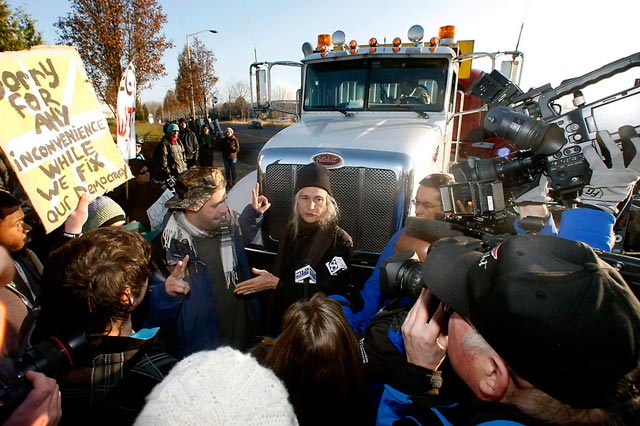
May 2012
Lessons from Portland’s D12 Port Blockade

Confrontation at Gate 5 of Port of Portland on December 12. (Photo: Rick Bowmer/AP)
By the Portland
Trotskyist Study Group
On December 12th,
2011,
hundreds of activists from Portland, Oregon
converged on the Port of Portland
to shut it down as part of the West Coast
Port Shutdown called for by Oakland
activists. Protesters targeted EGT, the
union busting grain giant, and called
for solidarity with the Longview ILWU
members in their struggle for a contract.
The action also supported the port truckers
who are paid very little and have
no union recognition, as well as criticizing
labor and environmental abuses,
both domestically and abroad, on the part of
the corporations running the
ports.
As the pickets
reached two
strategically chosen gates, it was clear
that the blockade had already had some
success. The gates were closed before the
workers were even due for their first
shift. Police made an attempt to turn away
protesters at Gate 5, but as the
morning wore on and not a single Longshore
worker entered the port, they took
their tear gas canisters and riot suits and
retreated. The blockade was then
left in charge of the two gates where cargo
was to be exchanged that day, as
well as the train tracks leading to the
grain terminal at Gate 5. Not a single
longshore worker crossed the line to go to
work.
Many activists on
the picket
lines were new to this type of action. Many
had never been on a picket line
before, and debates began as the pickets
settled in at the entrances to the
Port about the strategies and tactics
necessary to carry the day.
As the Port began
to open for
business and trucks began to move through
the sprawling facility,
confrontations broke out at Terminal 5
between protesters and drivers. As a
section of picketers attempted to set up a
barricade at the gate with some
construction fencing, the situation became
tense. Although the organizers of
the shutdown had specified that no vehicles
should be prevented from moving,
the protesters with the barricade were
undeterred.
The barricade was
a clear
departure from the methods that the
organizing committee had democratically
decided were appropriate for the action.
Still, activists who were part of the
committee were reluctant to interfere with
the barricade. Because the activists
with the construction fence were acting
according to their own plan, it was
argued that the protesters who didn’t want
to stop trucks should just continue
not stopping them, and allow the barricade
to persist. However, since the
demands of the demonstration clearly stated
solidarity with the port truckers,
it was decided that the trucks should be
allowed to pass.
Organizers of
Shutdown the
Port, in which we participated, called on
experienced class-struggle trade
unionists from the ranks of the picket to
deal with the confrontation, as some
protesters flung insults such as “redneck”
at the drivers, even though the
drivers were a part of the solidarity effort
of the day. We explained that the
port was already closed, thanks to
solidarity on the part of ILWU members who
were not at work, and that the effort to
blockade the port would benefit more
from outreach to the truckers than
confrontation with them.
The conflict that
erupted at
the entrance to the terminal continued as
trucks reached the gate and activists
again attempted to turn them away, with one
protester calling a trucker a
“scab” in the process. As the pickets parted
and the truck finally turned in to
the driveway, the picketer was challenged by
another activist, asking the
reason for the use of that word. The
picketer had been operating under the
misunderstanding that “scab” was a word to
describe any non-union worker, and
not a worker who entered a struck workplace
to reopen it.
The Portland
shutdown was a
success, with only one ship being loaded at
nearly midnight, and only because
there was no picket in place at the
beginning of the work shift. Although the
ILWU leadership resisted the shutdown from
beginning to end, the membership
decisively supported the action by not going
to work that day.
Without that
contribution on
the part of the workers at the Port, the
blockade that constituted a few
hundred people would never have been able to
shut the Port of Portland down for
the day. Without the experience and
dedication of the ILWU members who resisted
the bureaucracy’s attempts to demobilize and
vilify the D12 shutdown, the day
may have ended in disaster. Instead, not a
single train was loaded, and the
shipping terminals were idle.
Building a struggle that challenges capital’s rule will require more than just good demands; it will require the will of workers and their allies to enforce those demands. The lessons from the D12 shutdown are clear: Rather than acting on behalf of Port workers, it’s far more effective to act in solidarity with them. ■
To contact the Internationalist Group and the League for the Fourth International, send e-mail to: internationalistgroup@msn.com